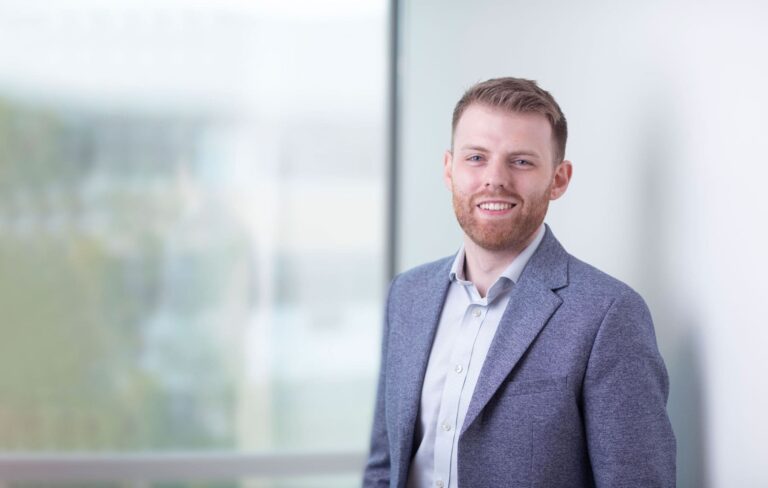Author
By the time these words reach the website, my trainee cohort will have moved into our second year, and a new set of trainees will be preparing for their first week at Michelmores. It’s been a fast year for me, and I remember well the excitement that the 2022 cohort must be feeling. Over the summer, I was in touch with our future trainees—those starting in September, and others joining after their studies—to ask whether they had any remaining questions about how to prepare for their training, and what to expect when it starts.
I’ve collected a few of their questions below.
The Solicitors Qualifying Exam (SQE)
- Where should I complete the SQE?
For applicants who have not yet completed the SQE, Michelmores prefers that you enrol at the University of Law. If, however, you completed your SQE at another institution, or are enrolled elsewhere when you apply, this won’t prevent you receiving an offer.
- Will Michelmores put me in touch with other future trainees at my institution?
While Michelmores won’t ordinarily put future trainees in contact when they begin their studies, present and future trainees meet frequently at Firm socials, and are kept in the loop through a ‘buddy scheme’.
- How do I pay for the SQE?
This one’s nice and simple. If you receive an offer prior to your SQE, Michelmores will fund it, and provide a bursary to support you while you study. If the offer comes after your exams, Michelmores will reimburse you for the fees.
Seat Rotation
- How likely am I to be allocated my first seat preference and location?
The Firm tries very hard to give each trainee their first choice, but this isn’t always possible. It depends on the preferences of other trainees and business needs. The main thing to remember if you’re worried about not getting your top seat is to be consistent. If you have a particular path in mind, make it known. If there are seats you definitely want to take but perhaps not first or second, rank them accordingly but give a full explanation of your reasoning, and emphasise what your ‘priority seats’ are from day one.
It’s also worth remembering that even if you are not sat in a particular team, you are more than welcome (and encouraged) to attend their knowledge sessions and events, where possible.
Relocation
- Are trainees able to train in Bristol or London for one or more seats?
Trainees have the opportunity to train in London for one six-month seat, and there is no limit to the number of seats you can apply for in Bristol. That said, you’re choosing practice areas or teams, rather than offices, so where you end up will depend on the sort of work you want to be involved in.
For example, the Commercial Litigation team is spread across the offices, and trainees in the team can expect to support fee earners in multiple locations. Still, I asked to be placed in the London team because it has a number of IP specialists – an area I have an interest in. Many teams operate like this, so it’s worth asking questions early on to get a sense of the work being done, who is conducting it, and where their teams are based.
On a more general note, I’d say it’s a good idea to complete a seat in another office, and most trainees do. It builds your profile in the Firm and broadens your training experience.
- Does Michelmores help with relocation if we undertake a seat in the London office?
In short, yes. The Firm has a flat available for trainee secondments. It is very close to the office, and most expenses are covered.
- Is it possible to complete a seat in a department based elsewhere, without relocating to that office?
It will be clear when you apply to join a team where that team is based, and there is a general preference that you work from that office – but this is not a hard rule. If you have any doubts about whether you will be expected to relocate, or have any preferences about this, I’d encourage you to make these clear when choosing your seats. The people who make the decisions on seat rotation are keen to understand your rationale, and will be happy to discuss your options.
Culture
- What sort of work/life balance can I expect as a trainee?
As you’ll expect, the amount of time you spend at your desk is likely to depend on the seat that you’re in, the time of the year, whether there are court deadlines or completions on the horizon, and your individual work-style. Still, Michelmores trainees consistently report their satisfaction with their work-life balance.
Of course, there are occasional peaks and troughs in most practice areas, and good time management is necessary to avoid last-minute sprints for a deadline, but it is generally true that early starts and late nights will not be necessary to meet your responsibilities. The trainee testimonials on Glassdoor, Lex 100, Chambers Student and Legal Cheek speak for themselves.
- Will I be working across offices (for fee-earners based elsewhere)?
Quite probably. As explained above, larger teams are often spread across the offices, and the type of work completed in each office can differ according to the interests and specialisms of the senior lawyers. Though you should bear this in mind come seat selection, you can expect to support fee earners across the team wherever you’re based.
This doesn’t necessarily mean that you’ll need to travel between the offices for work, especially since the transition to agile working (see below). That being said, Michelmores recognises that it is desirable (particularly for junior fee earners) to meet in person, at work and socially. This means that there are fairly frequent opportunities for interoffice travel, the most common examples being department meetings; marketing events; socials; and the occasional conference.
- How often do Michelmores trainees work in the office and from home?
Following a successful pilot last year, the Firm voted by a large majority to adopt agile working, which allows each team to decide for itself what expectations to set for home and office working. For most teams, this means two or three days a week in the office, with an anchor day to ensure that the whole team meets once a week. As a trainee, you should aim to be in the office more frequently than this, to learn from those around you and build relationships with your team.
Final Preparations
- What will my first few weeks at Michelmores look like?
In your first few days, you’ll have the pleasure of meeting Phil Willis, who provides excellent training on the core apps and systems that you’ll use every day. There will be meetings with the department heads, and you’ll get to know the rest of your cohort (which is especially important – here’s why).
Before joining your teams you’ll also sit the core modules of your Professional Skills Course. Thankfully, these are short, relatively informal, and getting them out of the way early means you won’t be distracted when you start your first seat.
- How can I prepare in advance?
Rest up; read in.
You’ve probably come straight from your studies, and you’re soon to begin your training. If you have some time in between, I suggest you take it. Rest up and be ready to start with your batteries charged.
Once you’re in, and completing your induction, you might reach out to your supervisor. They may have some questions for you, and can (if you ask) direct you to something to read for a head-start on the seat.

